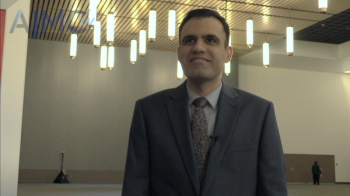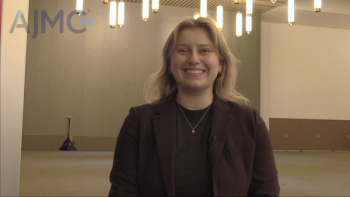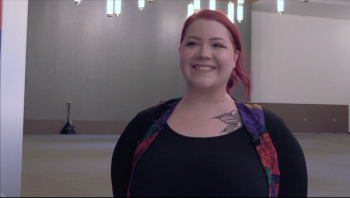
Dr Anshu Jain: We Must Be Teachers, Researchers, and Caregivers
In a preview interview for this year’s 2020 Community Oncology Conference, The American Journal of Managed Care® speaks with Anshu Jain, MD—radiation oncologist at Ashland Bellefonte Cancer Center in Ashland, Kentucky; assistant clinical professor at the Yale School of Medicine; and Community Oncology Alliance board member—on how important it is to always strive for excellence in medicine.
The 2020 Community Oncology Conference, hosted by the Community Oncology Alliance (COA), will take place on April 23 and 24. The American Journal of Managed Care® (AJMC®) recently spoke with Anshu Jain, MD, radiation oncologist at Ashland Bellefonte Cancer Center in Ashland, Kentucky; assistant clinical professor at the Yale School of Medicine; and COA board member. He will be presenting on day 1 of the conference.
You can register
AJMC®: In your session at COA, "Stereotactic Radiation Combined With Immunotherapy and Metastatic Disease," what will you be discussing?
Jain: So immunotherapy has represented a paradigm shift in the treatment of cancer and I think most notably in the treatment of metastatic disease. Stereotactic radiation was similarly a paradigm shift in radiation oncology by introducing the concept of delivering very high doses of radiation treatment in just a few treatments compared to the old, or conventional, way of delivering radiation treatments, which is a very small treatment every day for several weeks.
In the past several years, we’ve also increasingly recognized that stereotactic radiation therapy has unique effects on anticancer immunity. And so this has naturally led to the question about whether such modalities can be combined together to further improve our ability to care for our cancer patients. So this talk is really an overview on the scientific principles of combining these 2 paradigm-changing treatments and the emerging clinical evidence on such combinations.
AJMC®: When my father was being treated for his lung cancer, he would have to go every day for radiation, just for like 2 minutes.
Jain: I know, and treatment duration often depends on the stage of disease. For example, in stage 1 lung cancers, using the stereotactic radiation approach, we’re treating these patients in as little as 3 to 5 treatments. But for our patients who are in the stage 3 setting, they are getting 30 to 33 treatments, which is spread out over 6 to 6.5 weeks, and that’s still kind of considered pretty standard. But in that stage 3 setting, I think the combinations are very interesting; for example, the standard of care for stage 3 lung cancer still consists of combining chemo with radiation, but now we also add immunotherapy after a patient has completed chemo and radiation treatments. It has really led to dramatic improvements in outcomes, particularly for non—small cell lung cancer.
AJMC®: As a member of COA’s board of directors, what can you tell potential attendees about why they should register for the conference if they’re not quite sure how it will work virtually?
Jain: So to me, this is a no-brainer. The conference still represents an opportunity to attend and hear from an extremely diverse and talented group of speakers covering a really wide array of topics that are pertinent to community oncology. And now it’s kind of from your own home, you can check it out.
Having worked with many of the speakers directly, I can tell you that the knowledge, experience, and commitment they bring is unmatched. More importantly, their willingness to engage on these topics to help others in the pursuit of improving cancer care is, to me, what defines the spirit of the Community Oncology Conference. And just because the meeting is virtual, I don’t see any difference in that spirit changing. In fact, I think it will allow it to develop in new and more creative ways. And I think more, also importantly, COA’s decision to keep a lot of this content available to attendees for not just in the immediate time after the conference, but also several months in the future, is going to be very important to develop that engagement.
AJMC®: How has your daily practice changed in light of the COVID-19 pandemic?
Jain: Well, for us, our entire clinic workflow has changed. We’ve rapidly transitioned to telehealth, as many other practices have. We’ve altered our workflow, as well as physically changed the layouts of our waiting rooms and our clinic space to minimize waiting time, maximize social distancing. All of our staff and patients who come to the clinic are screened for COVID symptoms and triaged accordingly. All of our staff are utilizing some type of personal protective equipment, whether it be masks or N95 respirators; in particular, our nurses and radiation therapists who have frequent close contact with our patients who are receiving chemotherapy or radiation treatments.
You know, it’s a challenge for everyone. But we remind ourselves of our oath to do no harm. For many of our staff and providers, we frequently touch the patients not just to care for their medical needs, but also their emotional needs. We’ve certainly become more creative and skilled in addressing our patients’ emotional needs without touching and that’s a credit to our providers and staff.
AJMC®: I’ve realized in the interviews I've done for COA, everyone's made a point of how much they need to take care of not only the patient’s physical and medical needs, but their emotional needs as well. Because while they’re going through chemotherapy and radiation, they’re also being quarantined.
Jain: Yeah, and we have to remind ourselves that despite all of us going through this at the same time, we’re all kind of experiencing our own personal challenges daily, through the stay-at-home orders, putting ourselves in our patients’ shoes and imagining what it’s like to have to go through that and worry about cancer treatments and side effects and things like that. It becomes really an unimaginable task, and I think that keeping that at the forefront really helps us to put things in perspective for ourselves and our family, too.
AJMC®: As a senior fellow, you focus on data science initiatives. Can you tell us more about what that entails?
Jain: Sure. So I got interested in data science and oncology a couple of years ago as I saw that, increasingly, there was a focus on how can we use big data to improve cancer treatment. And I think that big data initiatives in oncology hold tremendous promise to advance cancer care.
About 2 years ago, I started a fellowship at the NCI [National Cancer Institute] and the FDA focusing on data science initiatives within oncology. And during that time, I’ve had an opportunity to work on several data-oriented projects, including working with population-based registries to collect more detailed cancer treatment information, holding symposia to educate providers on data science initiatives within medical and radiation oncology, [and] working with nonprofit organizations to collaborate with industry, for the goals of increasing data sharing and transparency and really creating a more efficient system for cancer therapeutic development. Through some of those opportunities, I’ve also had a chance to recently join the editorial board for the Journal of Clinical Oncology Clinical Cancer Informatics as well.
AJMC®: You were once quoted as saying, “Throughout med school, I was always taught if you go into medicine, pursue what they call a triple threat—excellence in patient care, research, and teaching.” How do you continue to live those values today?
Jain: Well, I remember that quote, and that was right at the time I was starting my practice, and that was almost 6 years ago. But I think that, to me, living those values today, it remains just as important. It remains important to me to remind myself that it’s still not just about the destination, it’s about the journey. The pursuit of those ideals is what is important to me.
I think our daily commitment to staying on the cutting-edge of patient care allows us to bring the newest advances in cancer treatment to our patients and certainly, in my practice, to underserved communities. My interest and my focus on teaching really allows me to participate in the training of the next generation of oncology providers, and that’s really rewarding itself to be a part of that. And I think, lastly, participating in research allows us to be a part of the evolution of cancer patient care whether it be through clinical trials, being able to bring those treatments to patients who otherwise may not have access to it, or working on translational oncology projects.
I think that by pursuing those 3 facets, professionally, it’s really given me a very well-rounded perspective on what’s needed to continually improve oncology and cancer patient care.
AJMC®: Thank you so much for your time.
Jain: Thank you for reaching out.
Newsletter
Stay ahead of policy, cost, and value—subscribe to AJMC for expert insights at the intersection of clinical care and health economics.









